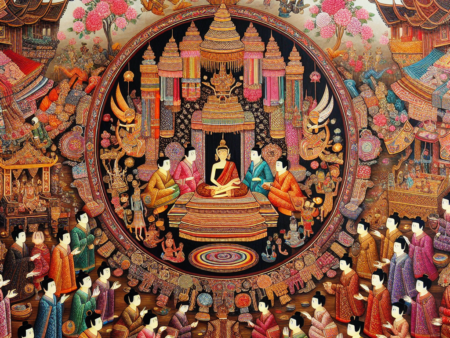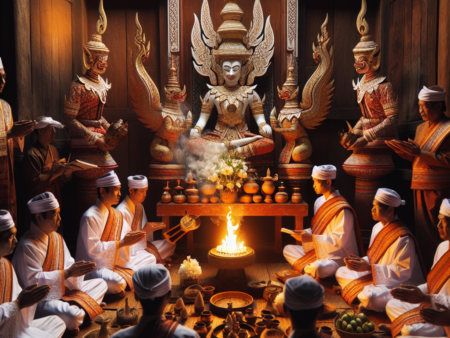Warisan Budaya dan Identitas Bangsa: Kekayaan budaya yang diwariskan dari generasi ke generasi, mencerminkan jati diri dan keunikan suatu bangsa.
Warisan Budaya dan Identitas Bangsa
-
Table of Contents
- Introduction
- The Importance of Cultural Heritage
- Preserving History and Tradition
- Strengthening National Unity
- Challenges in Preserving Cultural Heritage
- Urbanization and Globalization
- Environmental Threats
- Preservation Efforts and Initiatives
- UNESCO World Heritage Sites
- Community Involvement
- Conclusion
Introduction

Indonesia, with its rich cultural heritage and diverse ethnic groups, has a strong sense of national identity rooted in its cultural heritage. The concept of “Warisan Budaya dan Identitas Bangsa” (Cultural Heritage and National Identity) plays a crucial role in shaping the nation’s collective consciousness and fostering a sense of unity among its people. This article explores the significance of cultural heritage in Indonesia and its impact on national identity.
The Importance of Cultural Heritage
Cultural heritage encompasses the tangible and intangible aspects of a society’s history, traditions, customs, and beliefs. It includes artifacts, historical sites, rituals, performing arts, traditional crafts, and languages. In Indonesia, cultural heritage is deeply intertwined with the nation’s identity and serves as a source of pride and inspiration for its people.
Preserving History and Tradition
One of the primary reasons cultural heritage is important is its role in preserving history and tradition. Historical sites such as Borobudur and Prambanan temples in Central Java, as well as the ancient city of Yogyakarta, are not only architectural marvels but also symbols of Indonesia’s rich past. These sites attract tourists from around the world, contributing to the country’s economy while also reminding Indonesians of their ancestors’ achievements.
Traditional rituals and ceremonies, such as the Javanese wedding ceremony or the Toraja funeral rites, are passed down through generations, keeping the cultural fabric intact. These traditions provide a sense of continuity and identity, connecting Indonesians to their roots and fostering a shared heritage.
Strengthening National Unity
Cultural heritage plays a vital role in strengthening national unity by promoting a sense of belonging and shared identity among Indonesians. Despite the country’s vast ethnic and linguistic diversity, cultural heritage acts as a unifying force that transcends these differences.
The Indonesian government recognizes the importance of cultural heritage in fostering national unity and has implemented various initiatives to promote and preserve it. The Ministry of Education and Culture, for example, has integrated cultural education into the national curriculum, ensuring that every Indonesian student learns about their cultural heritage.
Challenges in Preserving Cultural Heritage
While cultural heritage holds immense value, it faces several challenges in Indonesia. Rapid urbanization, globalization, and modernization pose threats to traditional practices and cultural sites. Additionally, natural disasters, such as earthquakes and volcanic eruptions, can cause irreparable damage to historical sites and artifacts.
Urbanization and Globalization
As Indonesia continues to develop economically, urbanization and globalization have led to the erosion of traditional practices and values. Younger generations are increasingly exposed to Western influences, which can dilute their connection to their cultural heritage. The rise of digital media and social networking platforms further accelerates this process, as young Indonesians are more likely to engage with global trends rather than their own cultural traditions.
Environmental Threats
Indonesia’s geographical location makes it prone to natural disasters, which can have devastating effects on cultural heritage sites. Earthquakes, volcanic eruptions, and tsunamis pose significant risks to historical buildings and artifacts. For example, the 2006 earthquake in Yogyakarta caused severe damage to the Prambanan temple complex, requiring extensive restoration efforts.
Preservation Efforts and Initiatives
Recognizing the importance of preserving cultural heritage, the Indonesian government and various organizations have taken steps to safeguard and promote it.
UNESCO World Heritage Sites
Indonesia is home to several UNESCO World Heritage Sites, including Borobudur, Prambanan, and Komodo National Park. These sites receive international recognition and protection, ensuring their preservation for future generations. The government collaborates with UNESCO to implement conservation measures and raise awareness about the significance of these sites.
Community Involvement
Engaging local communities in the preservation of cultural heritage is crucial for its long-term sustainability. Community-based initiatives, such as the “Desa Wisata” (Tourism Village) program, empower local residents to showcase their cultural traditions and benefit economically from tourism. By involving communities, cultural heritage becomes a source of pride and economic opportunity, encouraging its preservation.
Conclusion
Cultural heritage plays a vital role in shaping Indonesia’s national identity. It preserves history, traditions, and values, strengthening the sense of unity among its diverse population. While challenges exist, the Indonesian government and various organizations are actively working to preserve and promote cultural heritage. By recognizing the importance of cultural heritage and involving local communities, Indonesia can ensure the preservation of its rich and diverse cultural legacy for future generations.







